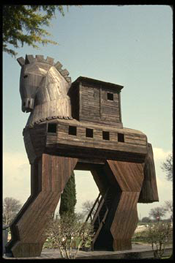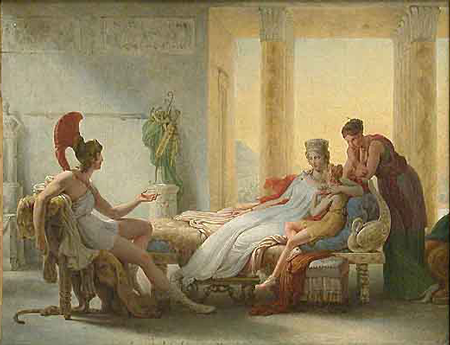
11 Nov 2007
BERLIOZ: Les Troyens
Les Troyens: Grand opéra in five acts.
Mozart and Salieri, an opera in one act consisting of two scenes.
Nicolai Rimsky-Korsakov (1844-1908), composer. Libretto derived from Alexander Puskhin's play of the same name.
First performance: 7 December 1898 in Moscow.
Ariadne auf Naxos, Oper with a prologue and one act. Music composed by Richard Strauss. Libretto by Hugo von Hofmannsthal.
La Vestale, a tragédie lyrique in three acts.
Boris Godunov, an opera in four acts with prologue
Modest Mussorgsky, composer. Libretto by the composer, based on Alexander Pushkin's drama Boris Godunov and Nikolai Karamazin's History of the Russian Empire
First performance: 8 February 1874 at the Mariinsky Theatre, St. Petersburg
Il Trovatore, dramma in four parts.
Only a few months following the premiere of Der Rosenkavalier, Hugo von Hofmannsthal proposed a new opera to Richard Strauss based on Molière’s comedy-ballet, Le Bourgeois gentilhomme (in German, Der Bürger als Edelmann).
Die Entführung aus dem Serail, Singspiel in 3 Acts.
Music composed by Wolfgang Amadeus Mozart (1756–1791). Libretto by Johann Gottlieb Stephanie the Younger, based on an earlier libretto by
Christoph Friedrich Bretzner.
Die Entführung aus dem Serail, Singspiel in 3 Acts.
Music composed by Wolfgang Amadeus Mozart (1756–1791). Libretto by Johann Gottlieb Stephanie the Younger, based on an earlier libretto by
Christoph Friedrich Bretzner.
Arabella: Lyrische Komödie in three acts
Die Entführung aus dem Serail, Singspiel in 3 Acts.
Music composed by Wolfgang Amadeus Mozart (1756–1791). Libretto by Johann Gottlieb Stephanie the Younger, based on an earlier libretto by
Christoph Friedrich Bretzner.
La Gioconda, dramma lirico in four acts.
Music composed by Amilcare Ponchielli (1834–1886). Libretto by Arrigo Boito (under the pseudonym Tobia Gorrio), based upon Victor Hugo's Angelo, Tyrant of Padua (1835).
Don Carlo, an opera in four acts. Music composed by Giuseppe Verdi (1813–1901). Libretto by Joseph Méry and Camille Du Locle after Friedrich von Schiller’s dramatic poem Don Carlos, Infant von Spanien. Revised version in four acts (French text revised by Du Locle, Italian translation by Achille de Lauzières and Angelo Zanardini).
Un ballo in maschera, a melodramma in three acts.
Music composed by Giuseppe Verdi. Libretto by Antonio Somma, based upon the work of Eugène Scribe Gustave III ou Le bal masqué (1833)
Medea: Melodramma tragico in three acts.
Die Tote Stadt, an opera in three acts.
Music composed by Erich Wolfgang Korngold (1897-1957). Libretto by Paul Schott (Julius and E. W. Korngold) after the novel Bruges la morte by Georges Rodenbach.
Some Details concerning the Revolution inaugurated by Rossini
Manon Lescaut, dramma lirico in quattro atti
Elektra: Tragedy in one act.
Lyric Opera of Chicago has announced both schedules and cast-lists for is Spring 2020 performances of Richard Wagner’s Ring Cycle. Given the series of individual productions already staged by the company since Fall 2016, that pave the way for the complete cycle, Lyric Opera of Chicago’s complete production should affirm the artistic might of the great composer.
“Diacono himself does not know what musical talent he possesses” – Mascagni

Les Troyens: Grand opéra in five acts.
Streaming Audio
Music composed by Hector Berlioz. Libretto by the composer based on Virgil’s Aeneid.
First Performance: 6–7 December 1890, Karlsruhe (complete)
| Principal Characters: | |
| Enée [Aeneas] Trojan hero, son of Venus and Anchises | tenor |
| Chorèbe [Coroebus] Asian prince, Cassandra’s fiancé | baritone |
| Panthée [Panthous] Trojan priest, friend of Aeneas | bass |
| Narbal minister to Dido | bass |
| Iopas Tyrian poet to Dido’s court | tenor |
| Ascagne [Ascanius] 15-year-old son of Aeneas | soprano |
| Cassandre [Cassandra] Trojan prophetess, Priam’s daughter | mezzo-soprano |
| Didon [Dido] Queen of Carthage, widow of Sichée [Sychaeus] Prince of Tyre | mezzo-soprano |
| Anna Dido’s sister | contralto |
| Hylas a young Phrygian sailor | tenor/contralto |
| Priam King of Troy | bass |
| A Greek Chieftain | bass |
| Ghost of Hector | bass |
| Helenus a Trojan priest, Priam’s son | tenor |
| Two Trojan Soldiers | basses |
| Mercure [Mercury] | baritone/bass |
| A Priest of Pluto | bass |
| Polyxène [Polyxena] Cassandra’s sister | soprano |
| Hécube [Hecuba] Queen of Troy | soprano |
| Andromaque [Andromache] Hector’s widow | silent |
| Astyanax her 8-year-old son | silent |
Setting: Troy and Carthage
Synopsis:
Act I
The site of the abandoned Greek camp on the plains of Troy
The Trojans are rejoicing that the Greeks have departed after 10 years of war and they prepare to drag into the city the great wooden horse which the Greeks have left behind.
Cassandre alone, daughter of King Priam, gifted with prophecy, fears the fall of Troy. She knows that her marriage to Chorèbe is doomed, and grieves that he thinks she has lost her mind since, along with the gift of prophecy, she carries the curse of never being believed. Chorèbe urges her to join the rejoicing, while she begs him to leave her and the doomed city before it is too late, but he refuses.
The royal family of Troy joins the people in thanking the gods for their deliverance. They are interrupted by Énée with strange tidings of the fate of the priest Laocon who, fearing Greeks bearing gifts, had been trying to urge the people to destroy the wooden horse when two serpents had emerged from the sea and devoured him.
Fearing the wrath of the gods who, it is concluded, must have punished Laocon for sacrilege, Priam orders the horse to be taken into Troy at once and the people prepare to make offerings to appease the gods. Cassandre watches, helpless, crying out that the city is doomed.
Act II
Tableau 1. A room in the palace of Énée
The ghost of Hector warns Énée to flee the city and take the gods of Troy to Italy, where he is destined to found a great nation. The priest Panthée runs in wounded, carrying the sacred images, with the news that the Greeks have burst out of the horse and are destroying the city. King Priam is dead. They prepare to fight, joined by Ascagne, the young son of Énée, and Chorèbe.
Tableau 2. A room in Priam's palace
Cassandre tells the praying Trojan women that Énée will escape and found a new Troy in Italy. Chorèbe is dead and she prepares to kill herself and exhorts the women to join her. As the Greeks burst in Cassandre and the women kill themselves.
Act III
A hall in the palace of Didon in Carthage
Surrounded by her people Didon celebrates the seventh anniversary of the founding of Carthage — after her husband had been killed she and her people had been forced to flee from their home in Tyre. Her sister Anna tries to encourage her to think of loving again; but she calls down a curse on herself if she is ever false to the memory of her husband, symbolised for her by his ring which she wears.
The poet Iopas announces the arrival of storm-tossed travellers seeking refuge, which she grants in memory of her own trials. nÈe is disguised as a sailor and it is Ascagne who asks for asylum, offering the riches of Troy in return. Panthée tells Didon their leader is Énée, whose destiny it is to find a glorious death in Italy, and she welcomes the Trojans.
Didon's minister Narbal brings news that Iarbas, fierce king of the Numidians, whose suit had been refused by Dido, is attacking Carthage, which is not strong enough to withstand him. Énée throws off his disguise and offers assistance. He leaves Ascagne in Didon's protection as he prepares to lead the Carthaginians into battle.
Act IV
Tableau 1. An African forest
The pantomime of the royal hunt and storm, with the word Italy punctuating the tumult.
Tableau 2. Didon's gardens by the sea
Narbal is worried that now that the Numidians have been defeated, Didon no longer attends to affairs of state, but spends the time hunting and feasting. When Anna explains that Didon loves Énée, he is concerned, knowing that fate calls Énée to Italy. But Anna sees no problem, feeling that Énée is equally bound to Carthage. She is delighted by her sister's happiness.
Didon, Énée and other Trojans appear and are entertained by songs and ballets, but Didon dismisses them and asks Iopas for something simpler. He sings a hymn to the goddess Ceres, but even that Didon finds not to her taste.
She asks Énée to tell her of the fate of Andromache, widow of Hector and is horrified to learn that Andromache has married her captor Pyrrhus, who had killed Priam and whose father Achilles had killed her husband Hector; but Didon also feels in some way absolved for her own love for Énée.
Unheeded by her, Ascagne playfully removes her former husband's ring from her finger. All leave except Didon and Énée, who confess and consummate their love. As they leave the moonlit garden the god Mercury appears, strikes the shield of Énée and shouts "Italy!"
Act V
Tableau 1. The sea shore
Hylas, a young Trojan sailor, sings of his lost homeland as he falls asleep.
 Énée et Didon by Baron Pierre-Narcisse Guérin (1815) [Musée du Louvre]
Énée et Didon by Baron Pierre-Narcisse Guérin (1815) [Musée du Louvre]
Panthée and other Trojan leaders prepare to leave: the ghosts of Hector and other dead Trojans have been seen along with other portents warning them they must be on their way. They expect that Énée will be strong minded and leave Didon. Two Trojan sentries have no desire to leave, having found girls and comfort in Carthage. Énée has told Didon he must go. Though grieved by her suffering, he remains firm in his resolve and prepares to bid her a last farewell, his resolve being strengthened by the appearance of the Trojan ghosts urging him on to Italy. When he tries to answer Didon's reproaches with explanations about his duty, she curses him and his gods.
Tableau 2. A room in Didon's palace
Didon begs Anna to plead with Énée. Anna feels guilt at having encouraged Didon to love Énée, but assures her that he loves her. They learn that the Trojans have already sailed.
The distraught Didon announces her intention of sacrificing Énée's gifts as an offering to the gods of the dead, intending to kill herself at the same time.
Tableau 3. A garden by the sea
The pyre has been built and the offerings placed on it. When the fire is lit, Didon mounts the pyre and stabs herself.
A vision of the glory of Rome appears, invisible to the bystanders, and Didon dies, prophesying that Hannibal will avenge the wrongs of Carthage on the Romans. The Carthaginians curse the race of Énée.
[Synopsis Source: Opera~Opera]
Click here for the complete libretto.
Click here for information on the New Berlioz Edition.